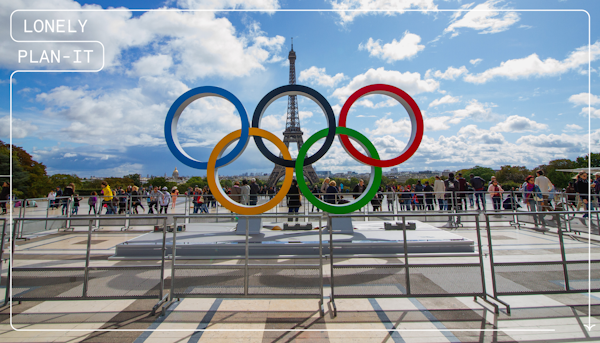
You’ve read about all the ways the Paris 2024 Olympics will set groundbreaking new precedents next year. And you’ve decided you want to be a part of history and attend the events in person.
Where to start?
There’s no need to panic. We’ve compiled a step-by-step guide that breaks down all the elements – flights, tickets, accommodation – that will make your trip planning more manageable.
What documents do I need to prepare for my visit to the Paris 2024 Olympics?
Holders of American, Canadian, British and (of course) EU passports can travel to France
visa-free if their stay is less than 90 days. If you’re not from any of these countries, the government has a clever portal called the “visa wizard” that will tell you if you need a visa for your visit, and the kinds of travel documents you’ll need to bring.
 Certain team events will take place outside of Paris, such as soccer at Marseille’s Stade Vélodrome © Michael Frankel
Certain team events will take place outside of Paris, such as soccer at Marseille’s Stade Vélodrome © Michael Frankel
Where are the Paris 2024 Olympics taking place?
In Paris, the games will be spread out across 15 Olympic and 11 Paralympic sites and extend beyond the Paris perimeter to suburbs like Les Yvelines to Hauts-de-Seine, Seine-et-Marne and Seine-St-Denis.
Certain events such as soccer, handball, basketball and sailing will be held in Bordeaux, Nantes, Lyon, St-Etienne, Nice and Marseille.
The surfing competition will be held in the overseas territory of Tahiti.
When do the Paris 2024 Olympic Games take place?
The Paris 2024 Olympic Games take place between July 26 and August 11, with the Paris 2024 Paralympic Games right after, from August 28 to September 8.
Where do I buy tickets for the Paris 2024 Olympics?
First things first: if you haven’t already bought your tickets to the games, you’ll need to create an account and register on the games’ official site. Keep in mind that all ticket sales will go now through a single portal. Organizers warn that if you buy tickets outside the main ticketing site, you run the risk of being denied entry, and that unauthorized ticket resales constitute an offense under French law.
At this point, there have already been three phases of ticket sales. The first two were lottery-based sales and required early registration. Round three opened in early July on a first-come, first-serve basis for four events that will take place outside of Paris: basketball and handball (Lille); soccer (Bordeaux, Lyon, Marseille, Nantes Nice, St-Etienne) and sailing (Marseille). At the time of writing, tickets are still available.
Originally scheduled to take place in late 2023, this latest sales phase was pulled forward due to higher-than-expected demand: organizers say over half of the 10 million tickets available were snapped up in the preceding two rounds.
Don’t forget that a resale platform will also open in the spring of 2024, so if you weren’t able to get tickets to your preferred event, you might still be able to.
Next year’s Olympics will also see four new additional events added to the games roster, including breaking, skateboarding, sport climbing and surfing.
Traveling in a large group? Take note that the ticketing system only allows you to buy a maximum of six tickets per online session – though you are allowed to max out at 30 tickets per account. Ticket prices vary according to sport, category and tournament round, starting at €24 and topping out at around €980. Check out the price guide here.
Tickets for the Paralympic Games open October 9 and will be sold in real time on a first-come, first-serve basis.
 The 2024 Olympic Games will take place all over the Paris region, and even other parts of France © Stephane Kempinaire / KMSP / DPPI
The 2024 Olympic Games will take place all over the Paris region, and even other parts of France © Stephane Kempinaire / KMSP / DPPI
What should I know before booking tickets for different Paris 2024 events?
Be careful about being too ambitious when booking several events on the same day, and make sure to factor in enough travel time between venues. Along with commute times, organizers recommend arriving at competition venues at least 1.5 hours before the start of the event.
To help spectators plan their itinerary, organizers have created a tool (still being rolled out) that will allow attendees to estimate the travel time between any two competition sites. An app that will offer suggested routes between venues will also launch closer to the games.
Why you should book your Paris 2024 Olympics accommodations now
Though we’re still a year out, the earlier you book, the better: prices for Airbnb listings and hotel rooms have already spiked to eye watering rates. According to Le Parisien, a 1130-sq-ft apartment near the Stade de France in Seine-St-Denis is listed at €600 a night compared to the usual €130–170.
Airbnb says that demand soared immediately after the opening of the second phase of ticket sales, with searches for stays during the games increasing ninefold in just four days.
The top five guest countries of origin for booked stays during the games so far include the USA, followed by Germany, the UK, France and the Netherlands. The average length of stay for European guests is six days, while the average stay for those outside the continent is eight days.
Hotel group Accor, whose brands include Sofitel, Mercure, Novotel and Ibis, is the official partner of the Paris Olympics and has already opened up reservations for next year. The group has 411 hotels, and 50,000 rooms in the Île-de-France region.
Bookings have also opened for the group’s long-stay-rental service Adagio, which specializes in “apart-hotels” that can accommodate up to 12 guests, depending on the location.
 This rendering shows the exciting plans for the Paris 2024 opening ceremony, set to take place outside of the stadium, on the Seine © Paris 2024 Florian Hulleu
This rendering shows the exciting plans for the Paris 2024 opening ceremony, set to take place outside of the stadium, on the Seine © Paris 2024 Florian Hulleu
How to book your accommodations for the Paris 2024 Olympics
We now get to one of the big planning challenges of your trip: being strategic about finding the right place to stay.
We’ll break it down into two large categories: the stress-free but pricier option in which the hard work is done for you, and the do-it-yourself hands-on vacation that will require a lot more leg work.
Let someone else do the planning for you
First, if budget allows and you’re looking for a hands-off approach to your Olympics experience, book with the event’s official hospitality partner On Location, which will do as much of the travel planning as you see fit.
All-inclusive travel packages include everything from accommodation, airport transfers, pre-selected tickets to competitive games, a personalized tour of Paris and transportation to and from the games. Packages range from three- to five-star levels of service and accommodations, and from one- to six-night stays. Other add-ons include tickets to the opening ceremony.
Individual hospitality packages, meanwhile, are simply add-on experiences to your sporting-event ticket and include access to private suites or shared lounges at competition venues, with extras like entertainment, food and beverages.
If you’re keen to attend the opening ceremony – which, for the first time in Olympic history, will take place outside a stadium – On Location has also created special packages for the historic event on the Seine river.
Tickets for the Riverside and Bridge 360 packages don’t come cheap, ranging from €5750 to €11,000. For such a price, though, you can expect guaranteed tickets offering premium views and seats along the lower quay. Around 400,000 spectators – 100,000 fewer than initially announced, due to security concerns – are expected to line the upper quays, where viewing will be free and open to the general public.
Take the hands-on approach
If that’s out of your price range, start your accommodation search by thinking about the events you’ll be attending.
The tourist office of Seine-St-Denis – site of the Olympic village, the Stade de France and the Olympic Aquatics Center, among others – has created a handy site powered by Booking.com that groups accommodations near some of the major hosting venues around the city, including the Stade de France, the Olympic Aquatics Center, Roland Garros and the Parc des Princes. If most of your events are at the Parc des Princes, for instance, save yourself the trouble of a sweaty, busy commute along with thousands of other spectators by booking something within walking distance to the stadium.
Similarly, at the end of this FAQ document prepared by the Paris tourist office, you’ll also find a useful interactive map showing the Olympic venues in the city, with suggestions of nearby hotels and restaurants.
You might want to apply the same principle if you plan to stay overnight in host cities outside Paris and book a room or rental near the major venues. Keep in mind, however, that several host cities are just a few hours from Paris by train, and can be done as day trips as well (more on that later).
Are the Paris 2024 Olympics accessible?
Yes. Every competition venue will feature a drop-off zone and dedicated priority line for those with disabilities. Spectators will be escorted to their seat, which will be assigned in a designated space that comes with good visibility.
 France’s superb rail system will whisk you from event to event, and from city to city © EQRoy / Shutterstock
France’s superb rail system will whisk you from event to event, and from city to city © EQRoy / Shutterstock
All you need to know about France’s rail system
Keep in mind that France’s ban on domestic short-haul flights of under 2.5 hours for trips that can be completed by train came into force this spring. That means that if your Olympic events are in cities like Nantes, Bordeaux and Lyon, your only option (unless you plan to drive yourself) is the train. Luckily, this also happens to be the easier and less stressful method of transportation.
That said, the different rail operators in France can cause confusion. Here’s a quick primer on the different rail lines and operators:
- The SNCF is the national rail service and operates the country’s high-speed TGV trains. A trip from Paris to Lyon on a high-speed train, for, instance, takes about two hours. This will be your first stop when looking up train tickets to other host cities.
- Inoui designates premium seats and service.
- Ouigo is the low-cost version of the SNCF, but tickets and times are more limited.
- Trains operated by Intercité serve cities without high-speed train routes and connect major cities without the need to transit from Paris. Routes include Nantes–Bordeaux and Toulouse–Marseille. The outfit also operates night-train services connecting Paris with cities like Nice, Lourdes and Toulouse.
- TER (Transport Express Régional) trains connect cities and smaller towns within the country’s 12 regions in metropolitan France.
- Transilien is the equivalent of the TER but for the region of Île-de-France.
- The RER (Réseau Express Régional) is a commuter line that operates within Paris and its suburbs.
 List of major transport hubs
List of major transport hubs
The logistics of planning a trip for the Olympics may seem daunting at first, but knowing your options and understanding how all the systems – for match ticketing, accommodations and transportation – work will hopefully make the picture clearer so that you can look forward to being a part of history.



